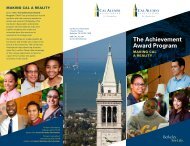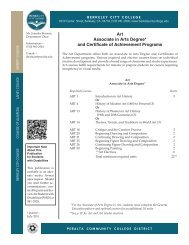Communication - Berkeley City College
Communication - Berkeley City College
Communication - Berkeley City College
You also want an ePaper? Increase the reach of your titles
YUMPU automatically turns print PDFs into web optimized ePapers that Google loves.
The Instructional (Academic Affairs)<br />
Program Review Narrative Report<br />
1. <strong>College</strong>: <strong>Berkeley</strong> <strong>City</strong> <strong>College</strong><br />
Discipline, Department or Program: COMMUNICATION (Dept. Arts and Cultural Studies)<br />
Date: November 5, 2012<br />
Members of the Instructional Program Review Team: Dr. Laura Ruberto (Dept. co-chair) and<br />
Dr. Cora Leighton<br />
2. Narrative Description of the Discipline, Department or Program:<br />
Department Description:<br />
The Department of Arts and Cultural Studies was formed in Fall 2008 out of a number of preexisting<br />
departments and programs. The reorganization offers a cohesive grouping to interrelated<br />
programs, it offers more visibility to the smaller disciplines housed within it, and it<br />
promotes students’ interdisciplinary perspective on culture, critical theory, and the visual and<br />
performing arts. The department is divided into distinct disciplines and programs all within the<br />
liberal and applied arts, including: Art History, <strong>Communication</strong>, Humanities (Film Studies,<br />
Religious Studies, Liberal Arts), Music, Philosophy, and Studio Art (Mural Art, Figure Drawing,<br />
Painting, etc.). Together these programs all support BCC’s overall goals, missions, and ILOs.<br />
<strong>Communication</strong> Discipline Description<br />
The discipline of <strong>Communication</strong> is represented at <strong>Berkeley</strong> <strong>City</strong> <strong>College</strong> by a series of core<br />
communication courses. These courses are structured as primarily transfer classes and as such<br />
focus not only on the major lines of inquiry within communication (rhetoric and speech) but also<br />
on strengthening general educational skills such as critical thinking, student writing, and student<br />
study skills. <strong>Communication</strong> 1A, the basic communication course, does an excellent job<br />
providing students with basic public speaking skills and also providing them with a foundation<br />
regarding rhetorical principles used in most professional settings. <strong>Communication</strong> courses at<br />
BCC are part of cohort programs at the college (i.e. PACE ). The majority of sections of<br />
<strong>Communication</strong> classes offered at the college are those classes required of students for transfer<br />
through IGETC, primarily Introduction to Speech and Interpersonal <strong>Communication</strong>, but also<br />
including Public Speaking, Persuasion/Critical Thinking, and the Dynamics of Group<br />
Discussion. Interpersonal <strong>Communication</strong>, Intercultural <strong>Communication</strong>, and Oral Interpretation<br />
of Literature are elective classes. We are beginning the process to implement the AA-T in<br />
<strong>Communication</strong> at BCC. We have a new, contract faculty member as of Fall 2012.
Recommendations<br />
-Review existing curriculum, develop more online courses and implement the AA-T in<br />
<strong>Communication</strong>.<br />
3. Curriculum<br />
The <strong>Communication</strong> curriculum is current and effective, reflecting recent trends within the<br />
discipline and keeping in mind the changing needs of BCC’s student.<br />
The majority of sections of <strong>Communication</strong> classes offered at the college are those classes<br />
required of students for transfer through IGETC, primarily Introduction to Speech and<br />
Interpersonal <strong>Communication</strong>, but also including Public Speaking, Persuasion/Critical Thinking,<br />
and the Dynamics of Group Discussion. Interpersonal <strong>Communication</strong>, Intercultural<br />
<strong>Communication</strong>, and Oral Interpretation of Literature are elective classes.<br />
-The curriculum is current and effective, but could benefit from three adjustments.<br />
1. The <strong>Communication</strong> SLOs need to be revised for most of the classes. The current<br />
(new Fall 2012) full-time faculty member has been working with the assessment<br />
committee to revise the SLOs and has a time frame to complete that work before the start<br />
of Spring 2013. Adjusting the SLOs will help to ensure that classes with similar content<br />
are distinct. For example, COMM 1A (Introduction to Speech) and COMM 45 (Public<br />
Speaking) have almost identical SLOs but are different courses. Adjusting the SLOs will<br />
help to ensure appropriate and equal preparation for all students.<br />
2. Second, the curriculum is currently very basic. Although this helps students to fulfill<br />
the basic needs in terms of transfer, it does nothing to stimulate students’ minds.<br />
Additionally, it does not address students who may be opting for the AA as their terminal<br />
degree. The curriculum should be expanded by adding classes that involve some deeper<br />
theoretical concepts. Again, the current full-time instructor is in the process of<br />
proposing new classes.<br />
3. Lastly, technology advancements would help bring the curriculum into the 21st<br />
century. First, online courses would help to serve students with geographical and time<br />
conflicts with face-to-face classes. Additionally, public speaking courses would benefit<br />
greatly from dedicated public speaking labs. These labs should include computers and<br />
screens for power-point presentations as well as cameras within projectors so as to video<br />
the speeches.<br />
Recommendations<br />
- One course release time for two semesters for the new contract faculty to updated<br />
course outlines and SLOs, as per above.<br />
-A dedicated Speech Technology lab
4. Instruction:<br />
Each classroom at BCC is equipped with the latest in video projection and internet access.<br />
This allows communication instructors to demonstrate on-line research skills to students.<br />
Also, given the proliferation of multi-media presentations in the professional world, students<br />
now have the ability to practice those skills in a classroom setting. Finally, the ability to<br />
incorporate on-line resources in the classroom provides a flexibility in accessing and sharing<br />
content.<br />
<strong>Communication</strong> instructors hold students to the highest standards. Given communication<br />
skills are noted as vital for personal and professional advancements, the faculty strive to<br />
teach these skills as part of an individual’s basic life experiences. Course syllabus are<br />
annually shared and reviewed to help maintain department consistency.<br />
Multiple sections of the same course are offered at different times of the day/week (as well as<br />
through distant education) in order to meet the needs of students with diverse schedules.<br />
All instructors are actively involved with service to the college—from attending department<br />
meetings, to sitting on committees, to participating in Title III and other important initiatives.<br />
Moreover, the contract instructor and the part time instructors remain active in their<br />
respective scholarly disciplines beyond their work at BCC. They are each, as individuals,<br />
connected to larger academic communities (both within and beyond community colleges).<br />
They frequently attend conferences, present papers, and publish articles. Many of our parttime<br />
instructors hold other positions, including teaching other colleges and universities where<br />
they are likewise involved in disciplinary conversations about pedagogy and scholarship.<br />
The program has a new, first-year tenure-track instructor. The program has also kept up with<br />
the evaluation of part-timers and the prioritized hiring pool.<br />
Recommendations<br />
-Keep COM 1A/COM 45 enrollment at a maximum of 30 students, in order to<br />
provide enough time for all students to practice their public speaking skills. Music<br />
instructors should be encouraged to stay active in their fields and take advantage of<br />
any available funding (staff development) to attend discipline-specific conferences or<br />
enroll in disciplinary professional associations, etc.<br />
- <strong>Communication</strong> instructors should be encouraged to stay active in their fields and<br />
take advantage of any available funding (staff development) to attend disciplinespecific<br />
conferences or enroll in disciplinary professional associations, etc.<br />
- <strong>Communication</strong> instructors should be supported and encouraged to incorporate new<br />
media and new pedagogical methods into their teaching through proper administrative<br />
support of such training and implementation.
- <strong>Communication</strong> instructors should be encouraged and supported to continue to meet<br />
regularly in order to exchange ideas and teaching approaches..<br />
- Work with counselors and BCC’s PIO to improve the marketing of the course<br />
offerings.<br />
5. Student Success:<br />
Review of attached data shows the following trends:<br />
Productivity rates have been steady, even with the cuts to sections and the fact that we have had<br />
uneven full-time instruction (we have a new full-time instructor who started Fall 2012 but we<br />
had a resignation of a tenure-track contract faculty two years ago).<br />
Our persistence rates and success rates are not only consistent but they have increased to 85%<br />
retention and 76% success. With our new contract faculty and the revision of SLOs and<br />
assessment rotations, we will be mindful of this increase in the hope of keeping the numbers<br />
steady.<br />
Course outlines need to be reviewed and updated (including SLOs)– the new full-time instructor<br />
has begun this process and is working with the assessment and curriculum committees to review<br />
the materials.<br />
Assessment of the courses began in Fall 2010.<br />
Recommendations.<br />
- Complete assessment—administrative assistance and/or release time for instructors<br />
to work on this is important.<br />
-Review all course outlines—release time would be beneficial<br />
-Work with counselors to better connect students to appropriate courses<br />
- Improve the marketing of the course offerings.<br />
6. Human and Physical Resources (including equipment and facilities)<br />
Each classroom at BCC is equipped with the latest in video projection and internet access.<br />
This allows communication instructors to demonstrate on-line research skills to students.<br />
Also, given the proliferation of multi-media presentations in the professional world, students<br />
now have the ability to practice those skills in a classroom setting. Finally, the ability to
incorporate on-line resources in the classroom provides a flexibility in accessing and sharing<br />
content.<br />
DEDICATED LAB: public speaking courses would benefit greatly from dedicated public<br />
speaking labs. These labs should include computers and screens for power-point<br />
presentations as well as cameras within projectors so as to video the speeches.<br />
The BCC Library is very supportive of the program with online links and other aids for our<br />
classes. However, more communication books should be added to the catalogue and a<br />
subscription to JSTOR would be beneficial.<br />
Recommendations<br />
-a Dedicated Speaking Lab is needed.<br />
-All <strong>Communication</strong> courses should be offered in 2050 Center Street unless offsite locations<br />
have current technology easily accessible in the classroom.<br />
-We would like to have appropriate <strong>Communication</strong> texts available in the BCC library. The<br />
library also should be funded adequately so that it can get a subscription to JSTOR.<br />
7. Community Outreach and Articulation<br />
The Program in communication ensures that the curriculum responds to the needs of the<br />
constituencies that it serves by keeping into close communication with the four-year public and<br />
private universities within our service area. The new instructor is beginning to work with local<br />
performance spaces, projects and venues to find new ways to get students involved in the<br />
curriculum.<br />
Since the majority of our instructors teach part-time at other colleges and universities, they bring<br />
those experiencing to BCC as well.<br />
Recommendations<br />
-Continue to find ways to collaborate and dialogue with four-year universities,<br />
community organizations, high schools, and private and non-profit institutions.<br />
8. BUDGET-RELATED QUESTIONS:<br />
a. If your department experienced a reduction in resources, describe the impact of that reduction<br />
on the overall educational quality of your unit and the <strong>College</strong>.<br />
Because we had had steady but careful growth in the years prior to budget cuts we have been<br />
able to cut sections with minimal impact. We were able to cut sections but keep a diversity of<br />
offerings (i.e., juggling daytime and night time and online offerings, create a rotation, etc.).<br />
Nevertheless, the impact was felt by students who turn to our classes to fulfill basic transfer<br />
needs (especially with COM 1A)–we were not always able to meet those student’s needs.
. How does the department plan to sustain the quality of instruction and/or services offered<br />
through your department in the current environment of reduced resource<br />
We will continue to offer courses on a rotation when necessary and cut multiple sections when<br />
necessary. We will advocate for the need for BCC to have its basic GE transfer disciplines all<br />
represented by at least one full-time instructor per discipline before expanding other programs or<br />
starting new ones (i.e., for careful and steady growth). We are fortunate to now have a new fulltime<br />
instructor who can assist in this careful growth plan.<br />
c. What does the department recommend that the college do to maintain quality educational<br />
programs and services<br />
a. Hiring of full-time faculty in each core collegiate discipline which does not<br />
currently have a full-time faculty member before further growth of new or<br />
existing programs.<br />
b. Focus on success and retention with AA-Ts<br />
c. Focus on 4 year institution preparation and transfer skills<br />
d. Hiring of more dedicated counselors<br />
e. Hiring of an Academic Dean<br />
f. Faculty advising with stipend/ release time and training<br />
g. Sabbaticals for Faculty<br />
h. Assess interdisciplinary programs for effectiveness<br />
i. Development of a Transfer committee to oversee specific transfer needs
















